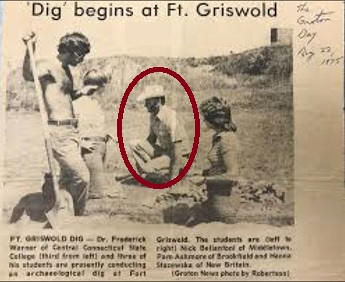In Remembrance: Frederic William Warner III - 1927 - 2016
reprinted from the Fall, 2016 edition of the FOSA Newsletter
A legend in Connecticut archaeology died this summer. Fred Warner passed away on August 7, 2016 at the age of
89. Memories of Fred conjure many deep feelings, including his dedication to archaeology and his unstoppable
energy that was a part of him until the end. His death comes as a shock to most of us since he never seemed to
age. Physically strong, mentally alert, bounding down the staircase of DiLoreto Hall, two and three steps at a
time leaving students half his age struggling to keep up. Witnessing him skip around a classroom, barely able to
contain his enthusiasm, was infectious. It was hard for a student not to become engrossed in archaeology. I
was. And, Fred brought that same energy to the field. He was never indifferent about his work.
 He completed his undergraduate training at Yale University and received his doctorate from Hartford Seminary,
where upon he was hired to teach anthropology at Central Connecticut State College and was already its
department head when I enrolled there in 1974. Fred was President of the Archaeological Society of Connecticut
at that time, a position he held from 1972 to 1978, and the year prior to my arrival, he had founded the
Connecticut Archaeological Survey (CAS), the first cultural resource management firm in the state, so at Central
there were field opportunities along with classroom training. So much was swirling around Fred during the 1970s
that the college seemed to us the epicenter of archaeology. Meetings were held, archaeologists visited,
projects planned and a library developed. It was a wonderful environment for a young, hopeful archaeologist.
He was my first professor of archaeology and CAS provided my initial field experience. His influence on me was
immense.
He completed his undergraduate training at Yale University and received his doctorate from Hartford Seminary,
where upon he was hired to teach anthropology at Central Connecticut State College and was already its
department head when I enrolled there in 1974. Fred was President of the Archaeological Society of Connecticut
at that time, a position he held from 1972 to 1978, and the year prior to my arrival, he had founded the
Connecticut Archaeological Survey (CAS), the first cultural resource management firm in the state, so at Central
there were field opportunities along with classroom training. So much was swirling around Fred during the 1970s
that the college seemed to us the epicenter of archaeology. Meetings were held, archaeologists visited,
projects planned and a library developed. It was a wonderful environment for a young, hopeful archaeologist.
He was my first professor of archaeology and CAS provided my initial field experience. His influence on me was
immense.
As was his influence on all of Connecticut archaeology. In 1979, Fred received funding from the Department of
the Interior administered through the CT State Historic Preservation Office (SHPO) to conduct a statewide
inventory of archaeological sites. Through that initiative, Fred compiled a comprehensive database synthesizing
known sites and listing new ones that represents today much of what is catalogued within the Connecticut
Archaeological Site Files and Maps maintained by the Office of State Archaeology and SHPO. That contribution
should not be underestimated, his tenacity in searching out what was known at that time, coordinating with
amateurs and professionals, casting his net to all corners of Connecticut, has helped us manage and preserve
hundreds of archaeological sites across the state.
Fred Warner's research interests eventually gravitated toward industrial archaeology. He was always hands-on,
loved his machines and understanding how they worked, so his passion in historical industrial technologies is
of no wonder. He even used a backhoe when appropriate at his sites. In particular, he specialized in the study
of early transportation mechanisms, including canals and railroads, as well as historic sources of energy (i.e.,
water, steam and electricity). Even after his official retirement from Central, he devoted time and effort to
researching and preserving the Beckley Iron Furnace in Canaan, a state-owned park listed on the National
Register of Historic Places. As a member of the Beckley Friends organization, Fred served as their resident
archaeologist, providing tours, developing exhibits and educating the general public on the iron industry and
the early mechanisms of the blast furnace. He served in a similar capacity with the Barkhamsted Historical
Society, remaining a passionate teacher to the very end. In addition, he served on the board of directors for
the Friends of the Office of State Archaeology for many years. Fred could never quit.
And, Fred could be controversial at times. He was strong-minded in whatever he thought was right, never
afraid to buck horns if he needed to. Yet, he could always disarm a competitor with his quick wit, endearing
smile and lusty laugh. Working with Fred was never boring!
Fred Warner stories abound and writing this brings back so many memories of my early development as an
archaeologist and a realization of the debt I owe him. In this regard, I am not alone. He inspired many
students with his energy, knowledge and personality and was often warmly referred to as "Uncle Fred." He leaves
behind three generations of family and two generations of students that deeply loved him.
Along with the academic side of archaeology, Fred taught us that our science demanded hard labor in the
field and he provided example by keeping himself in good physical condition. Many years later, as state
archaeologist at UConn, I was walking with a couple of my students across campus. When we arrived at our
destination, the undergraduates were gasping for breath as they attempted to keep up with me. We all laughed
about it, but that's when I realized I had become Fred Warner! I will always love him.
Readers are invited to add their thoughts.
Please send an email to fosa.ct@gmail.com, using "FOSA Website: Remembrance" in the subject line.